
Robert Dennis Crumb is an American cartoonist who often signs his work R. Crumb. His work displays a nostalgia for American folk culture of the late 19th and early 20th centuries, and satire of contemporary American culture.
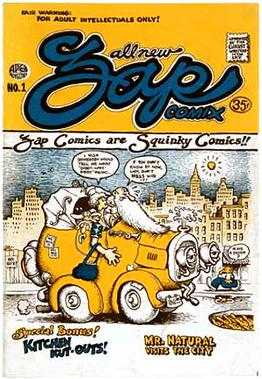
Underground comix are small press or self-published comic books that are often socially relevant or satirical in nature. They differ from mainstream comics in depicting content forbidden to mainstream publications by the Comics Code Authority, including explicit drug use, sexuality, and violence. They were most popular in the United States in the late 1960s and 1970s, and in the United Kingdom in the 1970s.

Zap Comix is an underground comix series which was originally part of the counterculture of the late 1960s. While a few small-circulation self-published satirical comic books had been printed prior to this, Zap became the model for the "comix" movement that snowballed after its release. The title itself published 17 issues over a period of 46 years.

Fritz the Cat is a comic strip created by Robert Crumb. Set in a "supercity" of anthropomorphic animals, it focused on Fritz, a tabby cat who frequently went on wild adventures that sometimes involved sexual escapades. Crumb began drawing the character in homemade comic books as a child, and Fritz would become one of his best-known characters.
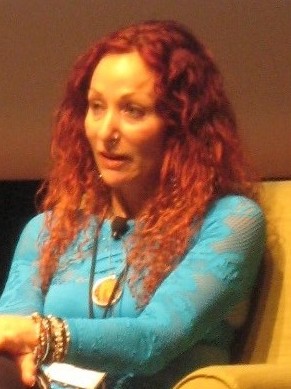
Aline Kominsky-Crumb was an American underground comics artist. Kominsky-Crumb's work, which is almost exclusively autobiographical, is known for its unvarnished, confessional nature. In 2016, ComicsAlliance listed Kominsky-Crumb as one of twelve women cartoonists deserving of lifetime achievement recognition. She was married to cartoonist Robert Crumb, with whom she frequently collaborated. Their daughter, Sophie Crumb, is also a cartoonist.
Dennis Worden is an American comic book writer and artist best known as the creator of the comic book Stickboy.

Kitchen Sink Press was a comic book publishing company founded by Denis Kitchen in 1970. Kitchen Sink Press was a pioneering publisher of underground comics, and was also responsible for numerous republications of classic comic strips in hardcover and softcover volumes. One of their best-known products was the first full reprint of Will Eisner's The Spirit—first in magazine format, then in standard comic book format. The company closed in 1999.

Trina Robbins was an American cartoonist. She was an early participant in the underground comix movement, and one of the first women in the movement. She co-produced the 1970 underground comic It Ain't Me, Babe, which was the first comic book entirely created by women. She co-founded the Wimmen's Comix collective, wrote for Wonder Woman, and produced adaptations of Dope and The Silver Metal Lover. She was inducted into the Will Eisner Hall of Fame in 2013 and received Eisner Awards in 2017 and 2021.

Denis Kitchen is an American underground cartoonist, publisher, author, agent, and the founder of the Comic Book Legal Defense Fund.

Mr. Natural is a comic book character created and drawn by 1960s counterculture and underground comix artist Robert Crumb. First appearing in Yarrowstalks (1967), the character gained a following during the emergence of underground comix in the 1960s and 1970s, and has been extensively merchandised in various products.
A comic jam is a creative process where one or more comics artists collaborates on drawing or painting one single comic. Often the process is that one artist creates the first page, and then another artist creates the second, and a third does the next, and so on. There is no script that the artists work from, and the content of the comics is improvised. Any given artist working on a comic jam makes a page based solely on what happened on the previous page. Variations include each artist contributing a single panel, or set of two or three panels, and then passing it on to the next participant. The cartoonists of the seminal underground anthology Zap Comix were known for contributing a jam comic to each issue of Zap from around issue #3 onward.

Diane Robin Noomin was an American comics artist associated with the underground comics movement. She is best known for her character DiDi Glitz, who addresses transgressive social issues such as feminism, female masturbation, body image, and miscarriages.

Angelfood McSpade is a comic book character created and drawn by the 1960s counter culture figure and underground comix artist Robert Crumb. The character first appeared in the Philadelphia-based underground newspaper Yarrowstalks #2 in July 1967, making her comics debut in the second issue of Zap Comix.
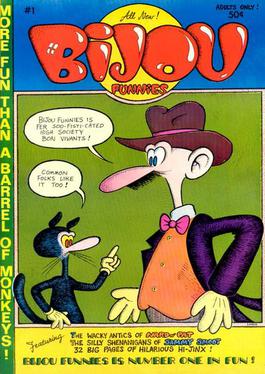
Bijou Funnies was an American underground comix magazine which published eight issues between 1968 and 1973. Edited by Chicago-based cartoonist Jay Lynch, Bijou Funnies featured strong work by the core group of Lynch, Skip Williamson, Robert Crumb, and Jay Kinney, as well as Art Spiegelman, Gilbert Shelton, Justin Green, and Kim Deitch. Bijou Funnies was heavily influenced by Mad magazine, and, along with Zap Comix, is considered one of the titles to launch the underground comix movement.

Donald Richard Donahue was a comic book publisher, operating under the name Apex Novelties, one of the instigators of the underground comix movement in the 1960s.
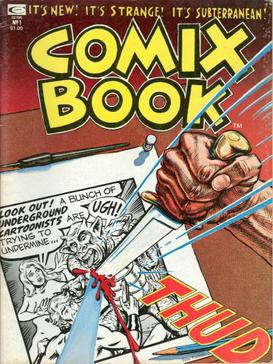
Comix Book is an underground comic book series published from 1974 to 1976, originally by Marvel Comics. It was the first comic of this type to be published by a mainstream publisher. Edited by Denis Kitchen, Comix Book featured work by such underground luminaries as Justin Green, Kim Deitch, Trina Robbins, Art Spiegelman, and S. Clay Wilson. While it did not depict the explicit content that was often featured in underground comix, it was more socially relevant than anything Marvel had previously published.
Leonard Rifas is an American cartoonist, critic, editor, and publisher associated with underground comix, comics journalism, left-wing politics, and the anti-nuclear movement. He is notable for his contributions to the form of minicomics as well as publishing Japanese manga in the United States. Rifas' publishing company, EduComics, operated most actively from 1976 to 1982.
Carl Vaughn Frick – often credited as Vaughn Frick or simply Vaughn – is an alternative cartoonist known for the exploration of gay, environmental, HIV/AIDS awareness, and radical political themes in his comics. His Watch Out! Comix #1 (1986) was an influential gay-themed comic, one of the first by an openly gay male cartoonist. His work was also included in issues of Gay Comix,Meatmen, Strip AIDS, No Straight Lines, and So Fey, a collection of Radical Faerie fiction.
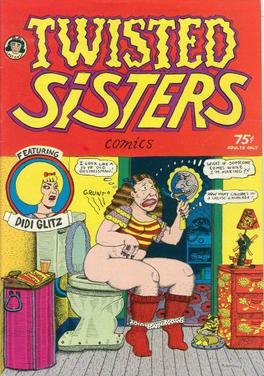
Twisted Sisters is an all-female underground comics anthology put together by Aline Kominsky and Diane Noomin, and published in various iterations. In addition to Kominsky and Noomin, contributors to Twisted Sisters included M. K. Brown, Dame Darcy, Julie Doucet, Debbie Drechsler, Mary Fleener, Phoebe Gloeckner, Krystine Kryttre, Carol Lay, Dori Seda, and Carol Tyler.
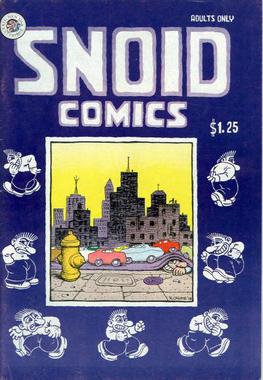
The Snoid, occasionally referred to as Mr. Snoid, is an American underground comix character created by Robert Crumb in the mid-1960s. A diminutive sex fiend and irritating presence, the Snoid often appears with other Crumb characters, particularly Angelfood McSpade, Mr. Natural, and Crumb's own self-caricature.















